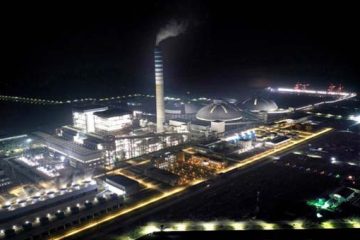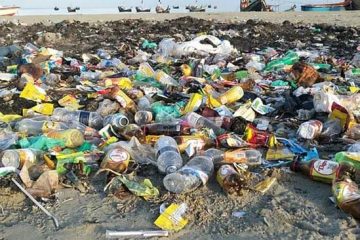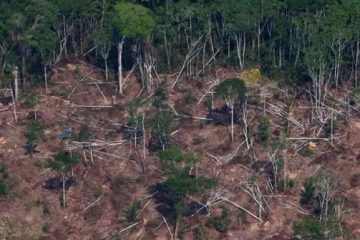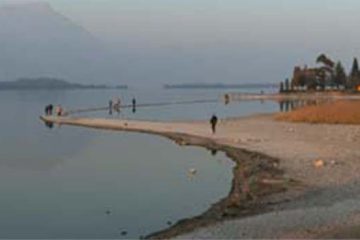Industrial Pollution
Growth at the cost of environment?
Md Koushik Ahmed for The Daily Star
 The “primitive accumulation” nature of developed countries to use all natural resources as inputs into a human devised system in the never ending quest for economic growth has led us to ask “what the future holds for us”. This growth oriented development strategy has resulted in industrial pollution all over the world. The rise of synthetic chemicals, most of which did not exist 75 years ago and their exposures which came from some of the 11,700 products made by 164 manufactures that contain these chemicals, have alarmingly increased the rate of over all industrial pollution.
The “primitive accumulation” nature of developed countries to use all natural resources as inputs into a human devised system in the never ending quest for economic growth has led us to ask “what the future holds for us”. This growth oriented development strategy has resulted in industrial pollution all over the world. The rise of synthetic chemicals, most of which did not exist 75 years ago and their exposures which came from some of the 11,700 products made by 164 manufactures that contain these chemicals, have alarmingly increased the rate of over all industrial pollution.
In a developing country like Bangladesh, the degree of industrial pollution is much more disastrous. According to the department of environment, six thousand kinds of liquid industrial waste are released into the water of Buriganga River creating a detrimental effect on human health and natural ecology.
The diseases caused by industrial pollution are very significant. Beyond harming human health, industrial pollutants destroy the biosphere, the slender margin atop the earth’s surface that supports life. The consequences are: (1) disruption of natural chemistry, (2) land conversion, (3) degradation of broad ecosystem.
United Nations Development Program et al (World Resources 2000-2001) notes, humans have converted 25 percent of land area to agriculture and another 4 percent to cities which in total counts to be 29 percent of the worlds land surface that has been changed from its pristine state. World Development Report 2003 argues, over the past 10000 years, global forests have been reduced by 20 to 50 percent and 0.52 percent of tropical forest area is lost each year.
For economic growth to be achieved, the nature must exist. Two solutions seem to be effective to ensure economic growth while saving environment: 1) to turn from ‘technocentric’to ‘ecocentric’ approach of development 2) to use regulatory programmes and policies.
Firstly, the technocratic approaches focus on human kind and the improvements in human standards of living and quality of life. These approaches do not involve radical changes in the current economic and political systems; rather a technical approach like improved industrial or energy generating system is adopted. The industrial activities in ‘technocentric’ approach have been legitimized by the western values that regard nature as adversary to be conquered.
Ecocentric approach, on the other hand, believes that it is the earth which is much more important than ideas about human progress and rapid economic growth. Aldo Leopold (1970) devised ‘Land Ethic’ which changes the role of Homo-sapiens from conqueror of land community to plain member and citizen of it. Naess (1984) argued that human domination of nature should be ceased which he termed as ‘deep ecology’. Singer (2002) argued that because of modern scientific insights, traditional ethical values about the environment no longer confirm to basic tenets of fairness. He writes we know that “[b]y driving your car you could be releasing carbon dioxide that is part of a causal chain to lethal floods in Bangladesh.
Secondly, the use of regulatory policies and programmes to reduce industrial pollution includes spontaneous involvements of international and national agencies through different programmes both globally and nationally. As many forms of atmospheric pollution are regarded as ‘global’ problems. Clean Development Mechanism (CDM) under Kyoto Protocol (1997) aims at reducing green house gas emissions on a global scale but to allow southern countries to ‘develop’. The agreement also target for national government to reduce emission.
On national level, a set of rigorous standards could be set under a different Act that can limit pollution from substances harmful to public health and the environment. The standard could be set with ‘an adequate margin of safety’ that protects even the most sensitive people.
Besides setting standard for the harmful substances some other regulatory options could be used on national level. Some of these regulatory options are command-and-control regulation, market incentive regulation and voluntary regulation.
Command-and-Control regulation includes setting uniform standards across industries, applying rigid rules to individual pollution sources, specifying cleanup technology, setting strict timetables for action, issuing permits and enforcing compliance, all with limited or no consideration of cost.
Market Incentive Regulation offers polluters’ financial motives to control pollution while also giving them flexibility in how reductions are to be achieved. Some of the varieties of market incentive regulation are Taxes and Fees, Deposit-and-Refund, Emission Trading Programs and Information Disclosure.
Taxes and Fees can be imposed on polluting emissions or products. Deposit-and Refund laws, on the other hand, require consumers of product that degrade the environment to pay an extra, refundable charge at the time of purchase, giving them an incentive to recycle the products after use. Emission Trading Programs, sometimes called Cap-and-Trade programs can be a good policy to reduce emission. It sets an overall limit on emissions of a pollutant. The total emissions are divided among individual sources by giving each source permits allowing the amount of pollution currently polluted. Information disclosure can also be used as a form of regulation through affecting consumer perceptions and equity prices.
Industrial activity welcomes economic growth and economic growth carries with it many threats to the thin, fragile biosphere in which human life exists. As such threats are recognised, societies adopt regulation to control the danger. However, regulation that only commands is inadequate to the ultimate task. What is needed, in addition, is our true conscience to save the environment first and then to go for economic growth since existence precedes essence.
Image credit: Anisur Rahman
The writer studies Development at University of Dhaka. Email: koushik_ahmed@hotmail.com





